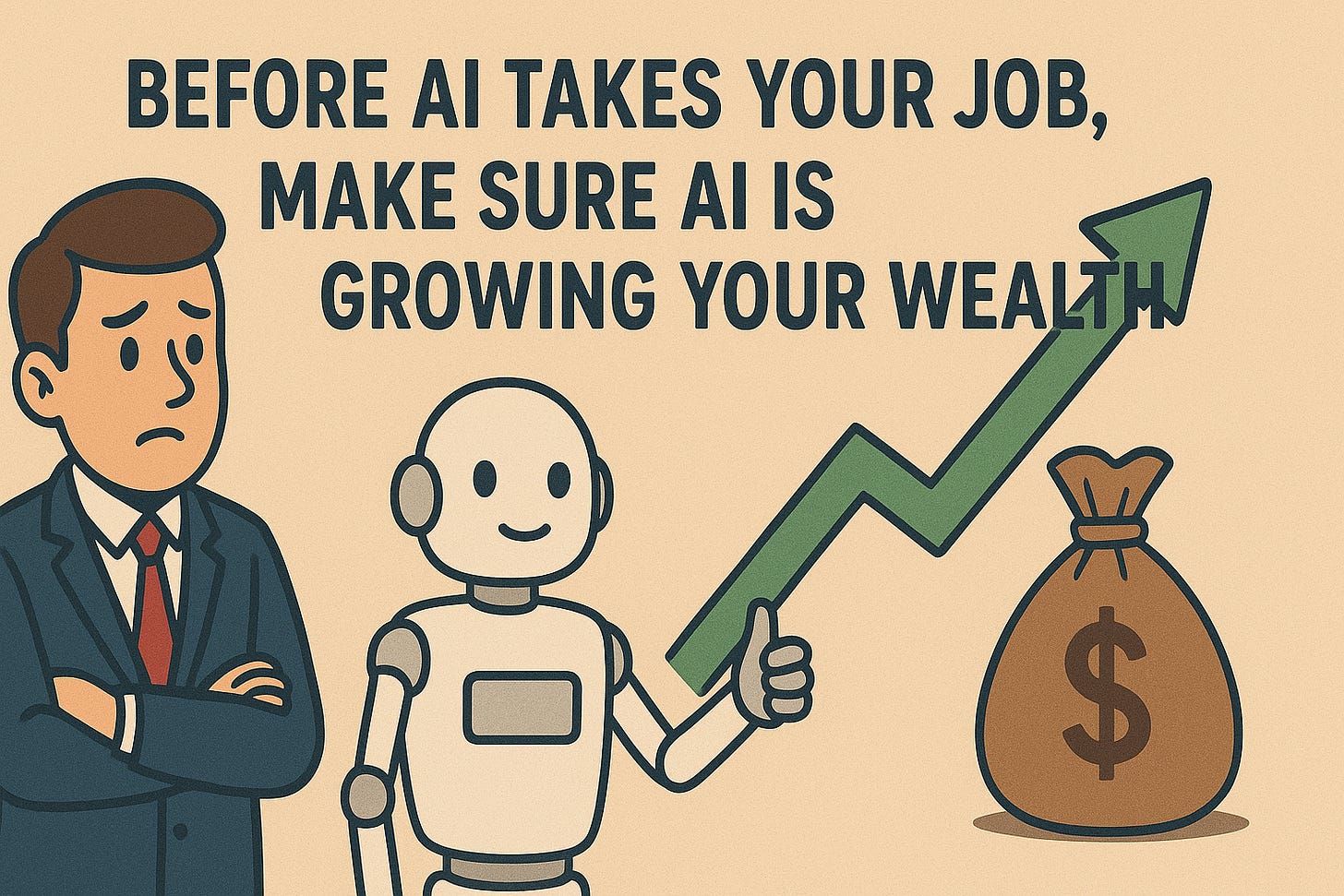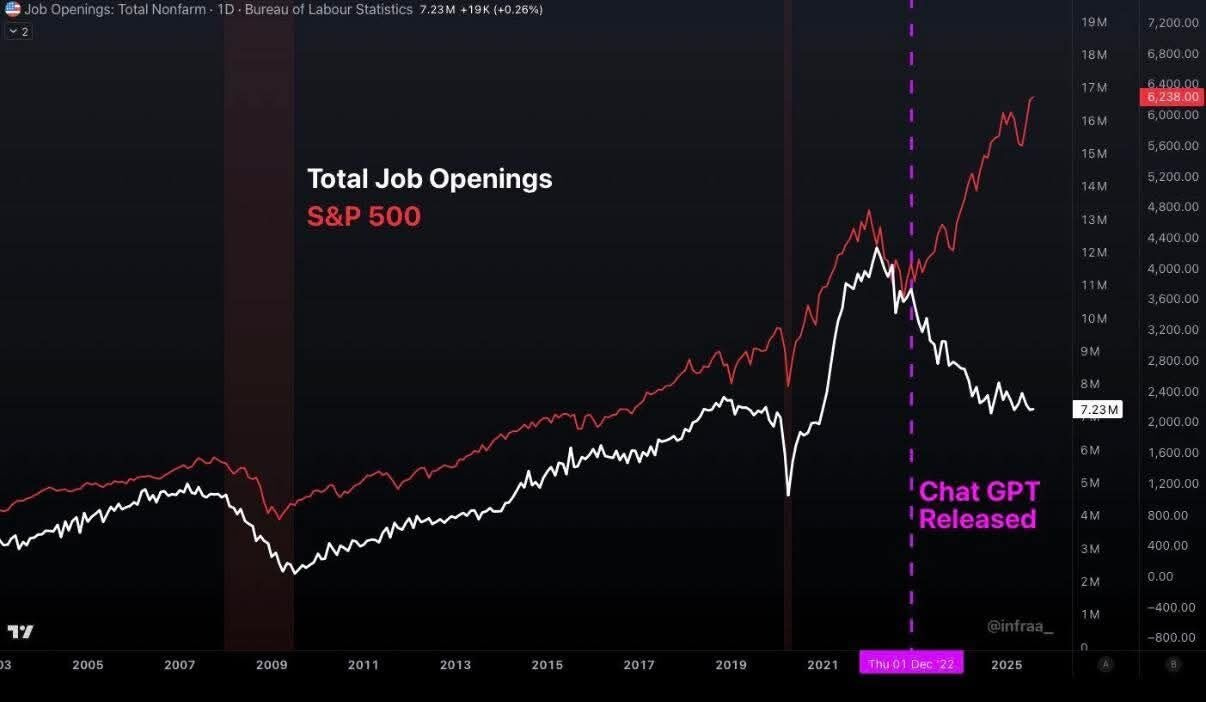Before AI takes your job, make sure AI is growing your wealth.
Why Stock Markets Thrive Even as Job Markets Tighten
Dear Investor.
Zee here. You’ve probably heard the question everywhere: “Stock markets are hitting all-time highs, but job openings are falling off a cliff.
How does that even work?”
On the surface, it seems contradictory. Usually, when companies are doing well and markets are booming, they hire more people, right?
But the data tells a different story, one that began the moment ChatGPT entered the scene.
Real Examples: S&P 500 Companies Cutting Jobs in 2025
If you think the job cuts are exaggerated, consider what’s actually happening at the largest companies:
As of October 1, 2025:
Intel has led with 33,900 job cuts
Microsoft has eliminated 19,215 roles.
Meta laid off 3,600 employees at the start of the year.
Google has been reducing hundreds of roles across its Android, Pixel, and Chrome teams.
IBM cut around 8,000 jobs in HR and other departments, citing AI tools taking over routine administrative tasks.
The pattern is consistent: many of these layoffs target automatable or redundant work, especially in early-career or administrative roles.
Of 180,094 global tech layoffs in 2025, at least 50,184 were directly related to AI and automation implementation. This isn’t speculation, it’s happening right now at some of the world’s most profitable companies.
What the Numbers Show
The Job Market Story
Job openings in America peaked at 12.1 million in March 2022. It was a worker’s paradise, companies were desperate to hire. But starting around late 2022, something shifted dramatically. By mid-2025, that number had collapsed to just 7.2 million. That’s a staggering 40% decline in less than three years.
To put this in perspective, we haven’t seen job openings this low since 2020, when the pandemic first hit.
The Stock Market Story
Meanwhile, the S&P 500 has been on a tear. After a rough 2022, the market rebounded strongly and climbed steadily through 2023, 2024, and into 2025. This rally has been driven primarily by technology stocks, particularly companies developing and deploying artificial intelligence.
The Timing Matters
Here’s where it gets interesting: ChatGPT launched on November 30, 2022. That’s right around when job openings started their sharp decline, while stock markets began their impressive rebound.
This timing isn’t coincidental. It marks the beginning of a fundamental shift in how companies think about growth.
What This Tells Investors
The divergence between rising stock prices and falling job openings suggests that companies have discovered a new playbook: they can increase productivity and profits through automation and AI rather than hiring more workers.
For investors, this changes the game. It means:
Profit growth without wage pressure: When companies can automate tasks instead of hiring, they keep more money on the bottom line
AI companies win big: Investors who bet on AI technology companies have seen massive returns
Traditional employment questions arise: The old correlation between economic growth and job creation is weakening.
The Bottom Line: What This Means for You
Here’s the hard truth: relying on a single job income isn’t the strategy it once was. The data shows that traditional employment is becoming increasingly unreliable as a sole income source.
This is why you need to take action now.
Whether that’s building passive income through investments, developing additional revenue sources, or positioning your portfolio to benefit from the AI-driven economy, the time to act is before the job market changes impact your personal finances.
The winners in this new economy won’t be those waiting for the next job opening. They’ll be the ones who saw this shift coming and positioned themselves accordingly.
Start diversifying your income streams or begin investing now, even in uncertain times.
Start your investing journey today for just $9.
Disclaimer:
All information here is for educational purposes only. This is not financial advice. Please do your own research and speak with a licensed advisor before making any investment decisions. Past performance is not indicative of future returns. How we invest may not suit your investment goals and risk management profile.




Wow, the part about IBM cutting 8,000 jobs in HR realy stood out to me. Such a smart take, Zee! Seems the machines are learning a bit too well, huh? Time to embrace the silicon overlords.